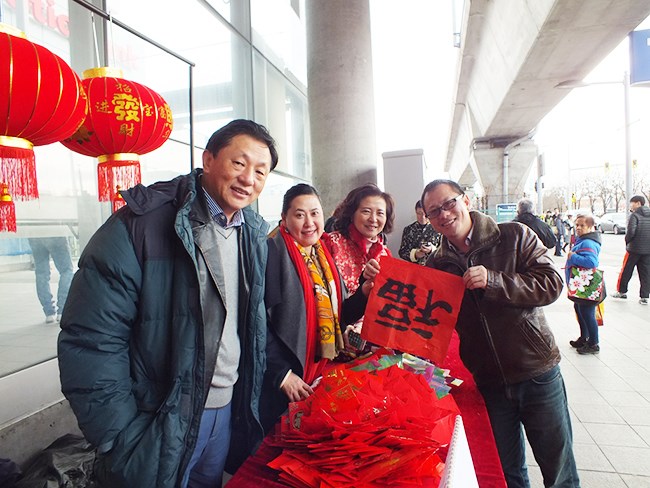Chinese New Year is a festival for families and friends to celebrate, but a group of Richmond residents want to enjoy the special time with everyone else in the city and show their appreciation for all the support they get from the community.
The group of Chinese-Canadian volunteers will share their Chinese New Year wishes, as well as free food, drinks and other blessings with people at Richmond-Brighouse Station Feb. 17 afternoon. Meanwhile clothes will be collected to donate to local charities.
Linda Chang, one of the organisers, said the event is inspired by Christmas and Vaisakhi Day, when people express their appreciation and give back to the community.
“Chinese New Year is usually celebrated among families and the Chinese community, but after living here, we have seen and learned how people from other ethnic groups are celebrating their festivals,” said Chang.
“For example, Indian groups share their food and joy with tens of thousands of people on Vaisakhi; there are also people giving back to the society every Christmas day, by donating clothes and making food for people in need.
“We, as immigrants, have enjoyed such a nice environment and inclusive society in Canada. We want to thank the community on our most important festival and share our happiness.”
Chang said a local Chinese calligrapher will demonstrate and teach people how to write traditional couplets, as well as the Chinese character for “blessing” so they can take “good luck” home with them.
Chinese New Year calendars and decorations, as well as red envelopes containing treats and good wishes will be given away, while Chinese traditional songs and instrumental pieces will be performed.
“All the Chinese wishes will be translated into English,” said Chang.
“We know recently there are conflicts in the community on some Chinese-only signs, which does no good for intercultural communication.
“The Canadian spirit is to share and love each other. When in Rome, be a Roman. If we only use our mother language, how do others in the community understand what we are doing?”
She added that the celebration has been adjusted to local customs. For example, popular Chinese New Year food, dumplings and tea, are replaced with donuts and coffee, to cater to tastes and avoid allergy risks.
“We hope people understand that, we, Chinese immigrants, also see Richmond as our home. We also want to give back to the community,” said Chang.
“Sometimes we don’t know how to do that but we are learning, and need more communication. We hope this event will continue every year and expand.”
Hilbert Yiu, president of the Chinese Benevolent Association of Vancouver, said he is happy to see more people sharing this Chinese tradition.
“Chinese New Year has thousands of years of history. As a country established on agriculture, this time is so important since it’s the beginning of the agricultural cycle; it’s the beginning of a new year,” said Yiu.
He added previous immigrants brought these traditions to Canada with them by boat, and kept them alive, although some traditions such as the CNY parade have been all but abandoned due to urbanization and rapid change.
“In the countryside in South China, we used to have a Chinese New Year parade, when lion dance performers would go to every house. The ‘lion’ would jump to pick a vegetable, which represents good luck,” said Yiu, who moved to Canada 40 years ago.
“It means that it will get rid of your bad luck and bring good luck, fortune and health, so you will have a good harvest the next year.”
Now when Chinese New Year parades are not taking place in most areas in China, it is still going on in downtown Vancouver after 45 years.
“Today, Chinese New Year is a chance for Chinese-Canadians to miss their hometown and celebrate their achievements in their new home,” said Yiu.
“It’s also an opportunity for other ethnic groups to understand our culture and traditions, and to celebrate the festival together.”



